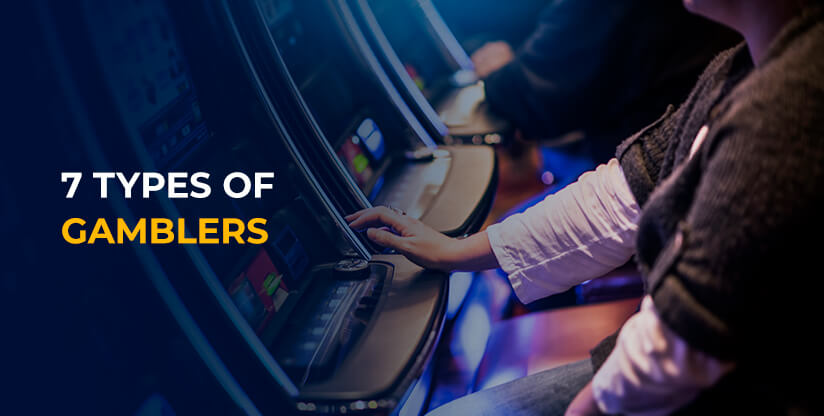- Apr 1
- Addiction

Not all addictions are the same, which is true for those struggling with a gambling disorder. People approach gambling differently, with their motivations, behaviors and attitudes varying slightly. People can also display characteristics of more than one type of gambler. Understanding these gambler types can help you determine the best treatment for yourself or a loved one experiencing this condition.
Here are seven types of gamblers that encompass a range of characteristics and behaviors.
1. Professional
Professional gamblers are those who make a living from gambling. They often possess skills, strategies and knowledge for specific games like poker, sports betting or blackjack. Professional gamblers are rare and often approach the activity as a serious profession, investing serious time and effort to hone their skills and develop a winning strategy. Being a professional gambler takes a high level of patience, frustration tolerance, self-control and intelligence.
These gamblers often weigh the odds of a situation and patiently wait for the best bet before proceeding. They dismiss anger and impulsivity, as these traits can stand in the way of their performance. It’s important to note that professional gamblers may not develop a full-blown addiction, as addiction often diminishes self-control and rational thinking, leading to more losses than wins.
2. Casual Social
Casual social gamblers are more common than professional gamblers. They participate in gambling primarily for entertainment and leisure, viewing it as a form of recreation and enjoying the excitement and sociability it can provide. For casual social gamblers, the activity can be a form of relaxation and doesn’t impact their personal or financial well-being. They approach it with a non-obsessive attitude, often playing for fun without focusing on winning or losing.
Examples of casual gambling include betting in poker games, the Super Bowl, yearly trips to Las Vegas or casual involvement in the lottery. These gamblers might stop in the casino from time to time, spending a moderate amount of money on blackjack or slots and leave by the end of the night.
3. Serious Social
Gambling can be either a positive or negative coping mechanism. While casual gamblers view gambling as one of many fun outlets, serious social gamblers rely solely on the activity to cope. They often approach gambling with a higher level of commitment and seriousness, engaging in it more frequently and with greater intensity.
These gamblers often know more about the games they play than casual social gamblers, who usually spend less money and time on the activity. Serious social gamblers also enjoy the sociability gambling can provide, seeking camaraderie in group activities like poker nights or casino outings.
For these individuals, gambling is a significant source of relaxation, although they place gambling second in importance to their family and career. They can often control their gambling activities without going overboard on spending. Over time, however, a a higher intensity of involvement can affect the likelihood that a person begins problem gambling.
4. Relief and Escape

Relief and escape gamblers turn to gambling as a way to relieve stress, emotional pain, boredom, anger, loneliness or negative life situations. They typically use gambling as a coping mechanism, seeking temporary distraction and relief from their problems. These gamblers display impulsive behaviors and might engage in excessive gambling to numb their feelings or avoid facing reality.
Gambling addiction often forms when people gamble to fulfill an emotional need. Relief and escape gamblers might use gambling to manage their depression, anxiety or other causes of stress — which can lead to an unhealthy cycle. These individuals can be unsuccessful at winning due to a lack of judgment and decision-making caused by their emotional state. They might lose significant amounts of money very quickly and experience more stress, anxiety and depression in the long term.
5. Personality
While the above types of gambling are considered legal, personality gamblers behave in illegal ways. These gamblers desire to make large amounts of money gambling by any means necessary. They often lie, cheat, steal and deceive others to come out on top, no matter the consequences.
Examples can include anything from hiding a card up a sleeve or conspiring to fix a race or sporting event. These gamblers are often thrill-seekers, constantly desiring the adrenaline rush gambling can provide. They are also attracted to high-risk, high-reward gambling and enjoy the challenge and competition it offers. Personality gamblers are more impulsive in their decision-making compared to the above types.
6. Conservative
Rather than chasing a thrill or enjoying the sociability of gambling, conservative gamblers are interested in the experience. They enjoy playing slots and rolling dice because they’re curious about them after seeing the activities in movies or TV shows. Conservative gamblers adopt a more cautious approach to gambling, prioritizing minimizing losses over seeking big wins.
These gamblers often place a modest budget or time limit on the activities and stick to them, whether they win or lose. Most will avoid high-stake gambling and opt for lower-risk games or bets. They often find satisfaction in the process of gambling rather than the outcome. Due to this, addictive gambling is rare among conservative gamblers.
7. Compulsive
Compulsive gamblers — or pathological gamblers — have a severe addiction. They cannot resist the urge to gamble, no matter the consequences, and often experience uncontrollable cravings to continue the activity. Compulsive gambling is a progressive addiction that can have adverse outcomes on a person’s entire life, including their social, physical, mental and financial health.
Signs of compulsive or problem gambling include:
- Overspending on gambling
- Making unsuccessful attempts to cut back or stop gambling
- Continuing to gamble despite the effect it has on relationships, work, school or home life
- Constantly chasing the successive win to recoup losses
Compulsive gamblers might resort to specific measures to fund their gambling, including neglecting responsibilities, borrowing money or engaging in illegal activities. They often cannot stop gambling, no matter how hard they try. As a result, compulsive gamblers can benefit from professional treatment that can include therapy, group support and holistic services. These interventions can improve a person’s chances of overcoming addiction and leading a healthier life.
Get Compassionate Care at Gateway Foundation
Gambling addiction is a complex disorder that requires a professional, nonjudgmental approach. Understanding the different types of gamblers can help you get the right treatment. If you or someone you know struggles with compulsive gambling or gambling addiction, Gateway Foundation can help you break from the cycle. Our dedicated team of professionals specializes in treating gambling disorders and providing the support needed for recovery.
With personalized treatment plans, evidence-based therapies and a compassionate approach, we can help you regain control of your life. Contact us today to take the first step towards a healthier and happier future free from the grips of gambling addiction. Your journey to recovery starts here.



